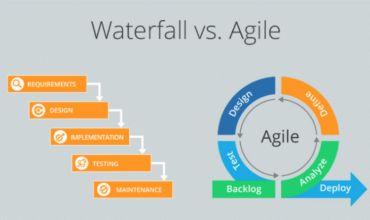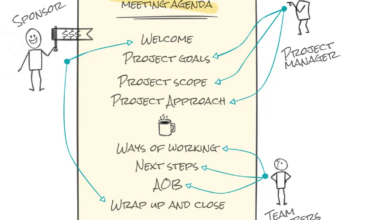A project is successfully when the assignment is completed on time, within budget and to the satisfaction of the stakeholders. The project manager enables the team to be successful. To be a good project manager, especially within the domain of IT, it is appropriate to have a strong background in technical knowledge. Last but not least, non-technical skills can help you in tackling those inherent in project management. Vision Although you should not make it too complicated, a vision is extremely important. Your vision gives you direction and as a manager you are in control, so that you ensure that the entire team knows what the goal is. Together you ensure result-oriented work. Your possible goals are: • Striving for the highest possible quality, within the agreed time and budget. • Helping all stakeholders within the agreed time, while preventing the workload within the team from becoming too high. • Increase the value of projects without sacrificing. Without vision, leadership is impossible! Listen With every project that is successful, you see the involvement of a listening project manager. Listening is essential to learn and keep in touch with all your stakeholders. Listening offers you the chance to ask the right questions, to get to know your customer and their needs. It is crucial that you develop a scope and plan to meet customer expectations without having to constantly adjust your project. People are diverse, and can therefore contribute to the goals of the project in different ways. This only works if you know how to approach them each in their own way and by listening to them. Ask control questions. By asking questions, you check whether your message has been conveyed correctly. Organize To be a good project manager you need to be organized. A lot is in motion in projects, which is why organizations also need project managers. A Project Manager has to keep track of tasks, problems, decisions, milestones and actions. This is a skill every project manager should have." If the project manager has a large number of projects running at the same time, it is important that he keeps and updates all information per project accurately. Because all project details are clearly available, the rest of the team can complete the project on time as agreed with the stakeholders. The work itself must be carried out in a logical and efficient manner. Part of organizing can be that as a project manager you investigate whether certain parts of the work can be automated. Proactive Project managers must be proactive. The word proactive is used a lot in management books, but it's an essential skill for people who lead teams, projects, or programs that involve dealing with both your own people and customers. A smug project manager is detrimental to a project. Project managers with initiative don't wait to be asked for work schedules, budget items or status updates. They ease the work of their teams and are always ready to tell what lies ahead. When you are proactive, you take action, take initiative and responsibility in all matters that you can influence. This implies that you also know how to limit and let go of those things over which you have no influence. A proactive project manager always has his plan, dashboards and risks up-to-date. As a Project Manager you are always ready to anticipate what can go wrong, or what your customer wants or what your team needs to do in the next phase. If you don't think several steps ahead and are afraid of missing out, you probably will. The best project managers are three steps and three days and three months in the future, anticipating what can go wrong (risk and issue log) and how to maneuver to avoid risks Pro-actively reward healthy behavior of your stakeholders! Detail-oriented The fixation on details that occasionally drives your partner crazy makes you incredibly successful as a project manager. Your ability to not let a single detail slip through the cracks while understanding how they all interact keeps the project on track. But on the other hand, you should not be overwhelmed by all the details. One of the strengths of a good project manager, we are often told, is the 'helicopter view'. This is the ability to not only edit the details, but step back to see and focus on the big picture. Communication It would be hard to cite anything other than communication skills as the most important asset of a good project manager. Most projects are complex, and the ability to communicate with different stakeholders and team members is key to the success of the project. The primary role of a project manager is that of communicator. Clear consistent communication is essential to the success of a project. Artful project managers make it their priority to understand their diverse project members and stakeholders, and they adapt their communication style and channel to reach and inform those different audiences.” Tips: • Be Diplomatic. You have to deal with different stakeholders, which means that interests can collide. You are able to substantiate why you make certain choices and create understanding or support for these choices. • Be Transparency. Be open and tell why you make certain choices. Also tell them if you don't want to share something with your team yet, so that you stay in touch with the team and can remove uncertainties. • Be clear. State what your expectations are and keep promises. This gives your manager, the team and your customer peace of mind. Delegate As good project managers, you know that you cannot do everything yourself. You will have to delegate the work to others. For this it is important that you know the strengths in your team, but also their workload so that you can delegate in the right way." Start delegating simple commands. There is a good chance that they will be carried out effortlessly, so that all parties become increasingly familiar with the situation and the next tasks in your project can also be taken up more quickly. Give your staff the chance to correct these mistakes. Do not solve problems yourself, because otherwise your employee will not learn anything. As a manager you always remain ultimately responsible for the result. Nevertheless, the delegated task is now a responsibility of your employee. That takes you a big step backwards, and it should stay that way. Don't fall into the trap of immediately taking the task back if you notice it isn't being done properly. Delegation is not possible without an extension of powers. You cannot expect an employee to successfully complete a project without sufficient opportunities to decide for themselves. It is the opposite of letting go and therefore sounds contradictory, but with delegation comes control. You agree in advance a certain expectation of the result, including associated deadlines. Flexibility and pressure resistance As a Project Manager you will always have to remain flexible. Projects can go off the rails. Successful project managers know how to adapt and get the project back on track. Changes in scope or feedback that are not always as positive as you would like to see will have to be approached flexibly. Sometimes you just have to go back to the drawing board. No matter how well you plan, you will inevitably have some chaos in a crowded market with tight deadlines and huge customer expectations. Resilience and still holding your position gives the team peace of mind and gives them the opportunity to do their job as well as possible. You will always have to work on the “triangle of project management”. More info on our blog: https://freelanceprojectmanager.be/iron-triangle-in-project-management/ realistic planner The team knows their own capabilities. They have the right insights about their capabilities. Involve them in drawing up a realistic plan. how productive your team members are. This allows you to determine the capacity and you know how much time is needed for customers and internal projects. With a realistic planning you create clear expectations for customers and stakeholders. Financial insight As a project manager you are responsible for the successful completion of projects. Good cost control is one of the KPIs on which you steer. Therefore, make sure you have a good financial overview of the projects and record this. You can submit changes to the financial plan to your stakeholders via a change control. Show leadership As a project manager you show leadership. You take initiative, make choices, take responsibility and enable the team to do the same. You are open to innovations
Project Management




